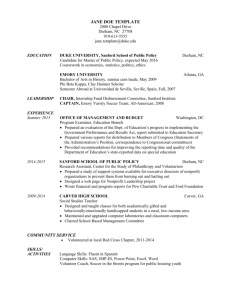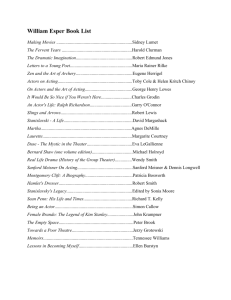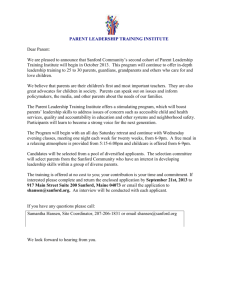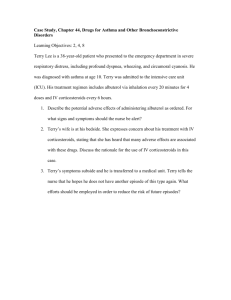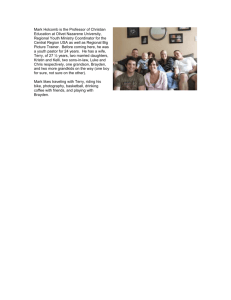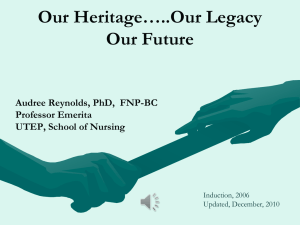Progress on the Lake Michie Watershed Policy study
advertisement
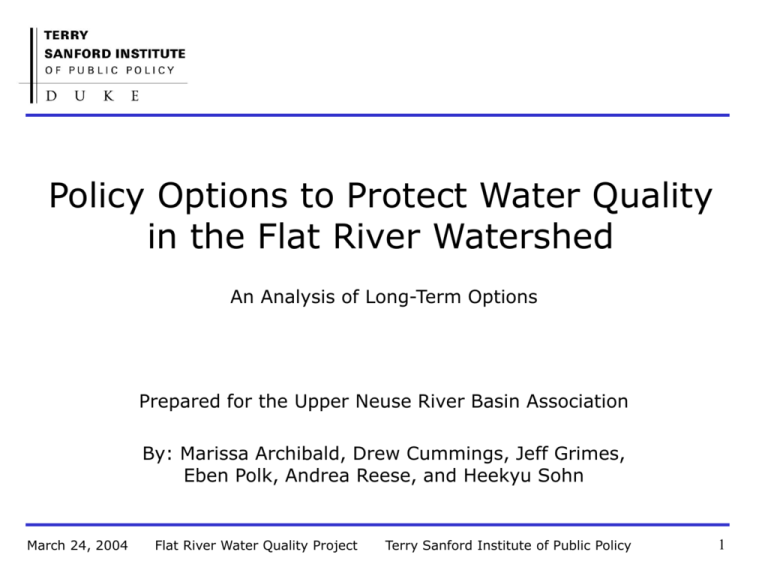
Policy Options to Protect Water Quality in the Flat River Watershed An Analysis of Long-Term Options Prepared for the Upper Neuse River Basin Association By: Marissa Archibald, Drew Cummings, Jeff Grimes, Eben Polk, Andrea Reese, and Heekyu Sohn March 24, 2004 Flat River Water Quality Project Terry Sanford Institute of Public Policy 1 Policy Question • How can local governments in the Flat River watershed protect water quality in a manner that is fair to communities in the watershed? March 24, 2004 Flat River Water Quality Project Terry Sanford Institute of Public Policy 2 Research Approach • Interviews • Case studies March 24, 2004 Flat River Water Quality Project Terry Sanford Institute of Public Policy 3 The Flat River Watershed • • • • Supplies half of Durham’s water Contained in five jurisdictions 170 square miles 12,000 residents March 24, 2004 Flat River Water Quality Project Terry Sanford Institute of Public Policy 4 Growth Projections • Population 300,000 300,000 200,000 165,000 100,000 12,000 0 2000 16,000 2025 Low Buildout High Buildout • Changes in Land Use – Decreasing forest and agriculture – Increasing residential and commercial March 24, 2004 Flat River Water Quality Project Terry Sanford Institute of Public Policy 5 Policy Problem: Future Degradation • Current regulations will not prevent degradation of water quality in the Flat River watershed • Stakeholders may feel it is a long term problem, distant enough to postpone action • Water users and landowners are not in the same jurisdiction March 24, 2004 Flat River Water Quality Project Terry Sanford Institute of Public Policy 6 Six Criteria 1. Any solution must protect water quality The ideal solution… 2. Is acceptable to all stakeholders 3. Is perceived as worthwhile and cost effective 4. Is affordable and technically feasible 5. Provides flexibility to adapt to future needs and technologies 6. Improves local governments’ capacity to solve future water quality problems March 24, 2004 Flat River Water Quality Project Terry Sanford Institute of Public Policy 7 Policy Spectrum Protection of Water Quality Indirect March 24, 2004 Direct Flat River Water Quality Project Terry Sanford Institute of Public Policy 8 Three Basic Strategies 1. Infrastructure 2. Land Use Limits and Practices 3. Pollution Limits and Controls March 24, 2004 Flat River Water Quality Project Terry Sanford Institute of Public Policy 9 Strategy 1: Infrastructure Option 1: Upgrade Water Treatment Option 2: Raise Lake Michie Dam Option 3: New Reservoir above Lake Michie March 24, 2004 Flat River Water Quality Project Terry Sanford Institute of Public Policy 10 Strategy 2: Land Use Limits and Practices Option 4: Zoning and Density Option 5: Impervious Surface Limits Option 6: Targeted Land Protection Option 7: Best Management Practices (BMPs) and Design Requirements March 24, 2004 Flat River Water Quality Project Terry Sanford Institute of Public Policy 11 Strategy 3: Pollution Limits Option 8: Performance Standards Option 9: Market for Pollution Permits • Set nutrient and pollutant limit • Allocate permits • Allow buying and selling for flexibility and efficiency March 24, 2004 Flat River Water Quality Project Terry Sanford Institute of Public Policy 12 Policy Spectrum Protection of Water Quality Indirect Raise Lake Michie New Reservoir Upgrade Treatment March 24, 2004 Direct Zoning & Density Impervious Surface Limits Land Protection Flat River Water Quality Project BMPs & Design Requirements Performance Standards Pollutant Cap and Trade Terry Sanford Institute of Public Policy 13 Water Quality Protection Process • Voluntary Local Action – Cooperative – Independent • Mandated Action – State / federal / court March 24, 2004 Flat River Water Quality Project Terry Sanford Institute of Public Policy 14 Cooperative Processes • Negotiation to Protect Water Quality – Primary stakeholders - Person County, City of Durham, and Durham County – Third-party mediation • Compensation and Incentive Structures • Voluntary vs. Mandated Cooperation March 24, 2004 Flat River Water Quality Project Terry Sanford Institute of Public Policy 15 Preliminary Conclusions • Design requirements and best management practices are an immediately feasible approach to water quality protection • Land acquisition and easements are feasible if funding can be located • Pollutant trading programs are direct, flexible, and increasingly feasible, and deserve further study March 24, 2004 Flat River Water Quality Project Terry Sanford Institute of Public Policy 16 Next Steps • Continue interviews and soliciting expert opinion of options • Continue case studies • Continue to evaluate options • Consider interim and long-term feasibility of options • Final report to be submitted May 1, 2004 YOUR FEEDBACK March 24, 2004 Flat River Water Quality Project Terry Sanford Institute of Public Policy 17 Contact Information • Drew.Cummings@duke.edu • Andrea.Reese@duke.edu • Eben.Polk@duke.edu • Heekyu.Sohn@duke.edu • Marissa.Archibald@duke.edu • Jeffrey.Grimes@duke.edu March 24, 2004 Flat River Water Quality Project Terry Sanford Institute of Public Policy 18 Questions? March 24, 2004 Flat River Water Quality Project Terry Sanford Institute of Public Policy 19 Interviews to Date • Tom Altieri, Orange County Planning Office • Kimberley Brewer, TetraTech • Scott Carpenter, Deputy Head of State Division of Water Quality • Steve Carpenter, Person County Manager • Bob Healy, Duke Professor • Becky Heron, Durham County Commissioner • Keith Luck, City of Durham Planner March 24, 2004 Flat River Water Quality Project • Sydney Miller, TJCOG Water Resources Program Manager • Paula Murphy, Person County Planning Director • Clarence Pointer, real estate agent in Person County • Terry Rolan, Director of Environmental Services for the City of Durham • Ernie Wood, Person County Planning Board Terry Sanford Institute of Public Policy 20
